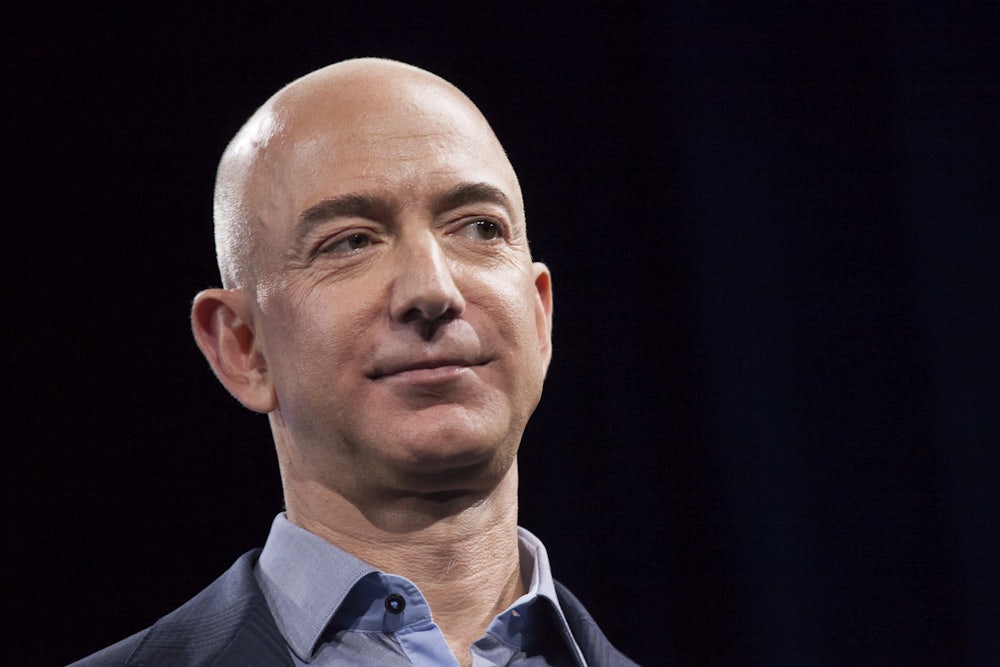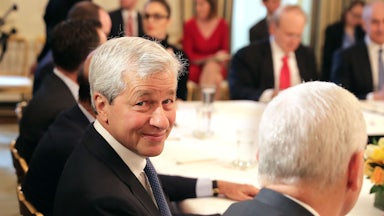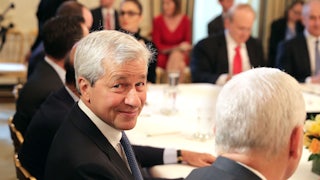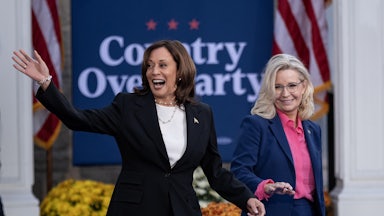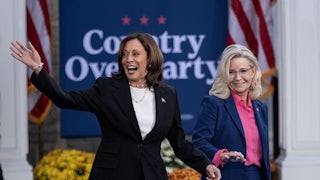In his 1963 “Letter From the Birmingham Jail,” Martin Luther King wrote that his generation would “have to repent … not merely for the hateful words and actions of the bad people but for the appalling silence of the good people.” A similar sentiment is often attributed to Edmund Burke: “The only thing necessary for evil to triumph is for good men to do nothing.”
Since Burke never actually said these words, allow me to rephrase them: The only thing necessary for evil to triumph is for powerful people to lack courage. That’s where we are, 11 days before an election that Donald Trump may win. Most of America’s leadership class understands that Trump’s reelection would be catastrophic in the manifold ways with which readers of this publication are well familiar. But a surprisingly large number of them are afraid to endorse Kamala Harris.
When I say “America’s leadership class” I don’t mean those Republican Party quislings, starting with Trump’s running mate, JD Vance, who initially identified Trump as evil (“reprehensible,” “cultural heroin,” “America’s Hitler,” etc.), then later capitulated. For an appropriately pitiless roundup of key Republicans who surrendered their party to Trump, I refer you to Mark Leibovich in the September issue of The Atlantic.
I have in mind a different group of leaders who in most cases bear no particular allegiance to the Republican Party. It may be a stretch to call them “good men” (they’re all men), but they’re astute enough to recognize the danger Trump poses, even as they decline to give Harris their public support. If Trump wins, it will be an exaggeration to say they caused it. But history will record that at a moment in their lives—in most cases, the only moment in their lives—when circumstances required them to show courage, they failed the test. Indeed, that silence may be the only thing succeeding generations will know about them. Let’s call them the Fraidy-Cats.
Jamie Dimon
Dimon is chief executive of JPMorgan Chase, the largest bank in the United States and the fifth-largest in the world, with $3.9 trillion in assets. Dimon himself is worth, per Forbes, $2.4 billion. Hear him roar! As I’ve observed previously, Dimon treats the Fed’s chief banking regulator like a scullery maid and its chairman like a slow-witted subordinate. But even though Dimon is a Democrat (I can’t fathom why), he’s unwilling to endorse Harris, reportedly because inviting Trump’s wrath is too scary.
Two years ago Dimon described as “treason” Trump’s public statements about the 2020 election. But on October 8 Dimon told Bloomberg that he was “thinking through what I want to say or do.” Then, this week, The New York Times’ Rob Copeland reported that “in private” Dimon has “made clear” that he supports Harris. Dimon won’t say so out loud because, Copeland reports, “he’s fearful that if Mr. Trump is victorious, he could retaliate against the people and companies who publicly opposed his run.”
Copeland attributes this information to “three people who asked not to be identified,” and states that Dimon himself “declined to be interviewed for this article.” But I’d be surprised if Dimon didn’t play some role in getting the word out. The trouble with a not-for-attribution endorsement is that it’s safely deniable. “We live in a perilous time,” Dimon intoned in an August op-ed piece for The Washington Post. “We should not sleepwalk into disaster.” It was like watching a prisoner of war blink “SOS” in Morse code.
In a written statement to the Times, Dimon’s spokesman said that he “has never publicly endorsed a presidential candidate,” but that isn’t true; Dimon publicly endorsed Nikki Haley in this year’s Republican primaries, and in the past he and his wife donated to the presidential campaigns of Bill Clinton, Bill Bradley, and Hillary Clinton. Dimon ended giving money to Democratic presidential candidates in the 2016 cycle, the same year Trump entered national politics, which may or may not be a coincidence.
What’s uniquely galling about Dimon is that even as he shirks his moral duty to endorse Harris, he’s nevertheless signaling that he’d kind of like to be her Treasury secretary. In private, the Times’ Copeland reported, Dimon allows that he “would consider a role, perhaps Treasury secretary, in her administration.” I hope and expect that Dimon’s fearful withholding of an endorsement will disqualify him for the job. Fraidy-Cats need not apply.
Warren Buffett
The Oracle of Omaha is, per Forbes, the sixth-richest human on the planet, with a net worth of $144 billion. He is also 94 years old, an age at which even nonbillionaires tend not to give much of a damn about what anybody else thinks. Buffett campaigned actively for presidential candidates Hillary Clinton and Barack Obama, and in 2016 he taunted Trump about not releasing his tax returns. “You’re only afraid if you’ve got something to be afraid about,” Buffett said. Buffett said in a Notre Dame lecture a decade and a half earlier:
Where did Donald Trump go wrong? The big problem with Donald Trump was he never went right. He basically overpaid for properties, but he got people to lend him money. He was terrific at borrowing money.
Clearly, Buffett is no fan of Trump. But after 2016 he ended all political involvement, and today he’s not only afraid to endorse Harris, he’s afraid some rumor or deepfake video will make people think he endorsed Harris (or Trump). To eliminate that possibility, Buffett issued a statement this week clarifying that he won’t. Asked why not by The Wall Street Journal, Buffett said: “I’ll probably address that question at the next annual meeting” in May. But not, I would guess, if Trump is president.
Patrick Soon-Shiong
Meet the owner of the Los Angeles Times, a surgeon and pharmaceutical tycoon worth, per Forbes, $6.5 billion. Soon-Shiong purchased the ailing newspaper in 2018, and it hasn’t gone well; the paper lost $30 million last year, according to The Wall Street Journal.
On October 11 the paper’s editorials editor, Mariel Garza, was roughing out an endorsement of Kamala Harris when the paper’s news editor, Terry Tang, informed Garza that Soon-Shiong had decided that the LA Times would not endorse any presidential candidate this year. Thirteen days later, Garza resigned, telling Sewell Chan of Columbia Journalism Review (who held Garza’s job previously), “I am resigning because I want to make it clear that I am not OK with being silent. In dangerous times, honest people need to stand up. This is how I’m standing up.”
Please note that Garza, who demonstrated courage, is a woman. Practically the only people demonstrating any balls this political year are women. Liz Cheney is the only high-ranking Republican in Congress to burn her bridges with Trump, and Pelosi was just about the only Democrat last summer willing to press a relucant President Joe Biden to withdraw. “The men were MIA,” a source tells Jonathan Alter in his new book, American Reckoning. “She wasn’t happy that the only bloody fingerprints on the knife were hers.”
But I digress.
For 32 years after Watergate, the LA Times avoided endorsing presidential candidates because it felt embarrassed about endorsing disgraced President Richard Nixon in 1972. Starting in 2008, though, it resumed making endorsements, and through 2020 it reliably endorsed the Democratic nominees. Writing Wednesday on X, Soon-Shiong defended his decision thusly:
The Editorial Board was provided the opportunity to draft a factual analysis of all the POSITIVE AND NEGATIVE policies by EACH candidate during their tenures at the White House, and how these policies affected the nation.… Instead of adopting this path as suggested, the Editorial Board chose to remain silent and I accepted their decision.
This does not appear to be true; Garza told Chan that she never received any request for such an analysis. In her resignation letter, Garza wrote Soon-Shiong that “staying silent isn’t just indifference, it is complicity.” She’s right.
Mitt Romney
I said I wasn’t going to pillory Republican officeholders, but Romney occupies a special category: won’t capitulate to Trump but won’t endorse Harris, either. Romney had the courage to vote, twice, to convict Trump after Trump’s two impeachments, but he doesn’t have the courage to endorse Trump’s opponent. According to The Washington Post, that’s because Romney is afraid of threats to his family. But as TNR’s Edith Olmsted pointed out, Romney told The Atlantic that when Trump says, “I am your retribution,” he fears that Trump will use a second term to go after him. If this last is true, why wouldn’t Romney do everything in his power to prevent Trump from regaining office?
A less contradictory explanation cited by the Post is that Romney wants to “preserve his ability to rebuild the Republican Party in a post-Trump world.” What Romney really fears is losing influence in the GOP after Trump is gone. But in a true “post-Trump world” it should be Trump collaborators who have the most to fear, not Trump defiers. Romney’s hesitation strikes me as garden-variety opportunism.
John Kelly
Kelly was Trump’s longest-serving chief of staff. This week, he told The New York Times that Trump is a fascist who admires Adolf Hitler. Four years ago Kelly told The Atlantic that Trump said people who die in combat (as Kelly’s own son did) are “losers” and “suckers.” Just about all the worst stuff I know about Trump I’ve learned from Kelly. Yet the man won’t endorse Harris, who is not a fascist, does not admire Hitler, and does not mock people who made the ultimate sacrifice for their country.
Kelly is a retired Marine Corps general, and military leaders, even retired ones, don’t consider it appropriate to endorse candidates. But when Kelly agreed to join Trump’s administration, first as Homeland Security secretary and then as chief of staff, he gave up any pretense to being a political virgin. If Trump is a fascist, then the only patriotic thing for this ex-general to do is endorse Harris. The same goes for H.R. McMaster, the former Army lieutenant general who similarly put on his civvies when he became Trump’s national security adviser.
Jeff Bezos*
Bezos is the third-richest person in the world (net worth $207 billion, per Forbes), the chairman of Amazon, and, as of October 25, the wealthiest coward in America. Bezos owns The Washington Post, the second-most-important newspaper in America, which will not endorse any candidate for president. William Lewis, the Post’s publisher, posted a risibly solemn and quite obviously false explanation why not, which harkens back to times past (1960 to 1972, apparently) when the Post took the position that endorsing a president would compromise what it called, in 1960, its “principles of independence.” Which raises the question of why the paper publishes editorials at all.
The word “principles” has no place in this statement, because the reason the Post won’t endorse anyone is that it fears a President Trump will cancel Amazon’s government contracts.
Hmm. That’s six (or seven) Fraidy-Cats, and I’ve barely scratched the surface. Let’s call this part one. Email additional candidates to tnoah@tnr.com.
*This article has been updated to include Bezos.
Read Part Two of this story here.
